This premium content is exclusive to edie Members.
To find out more about edie Membership, please click below.
If you are an existing member, login here
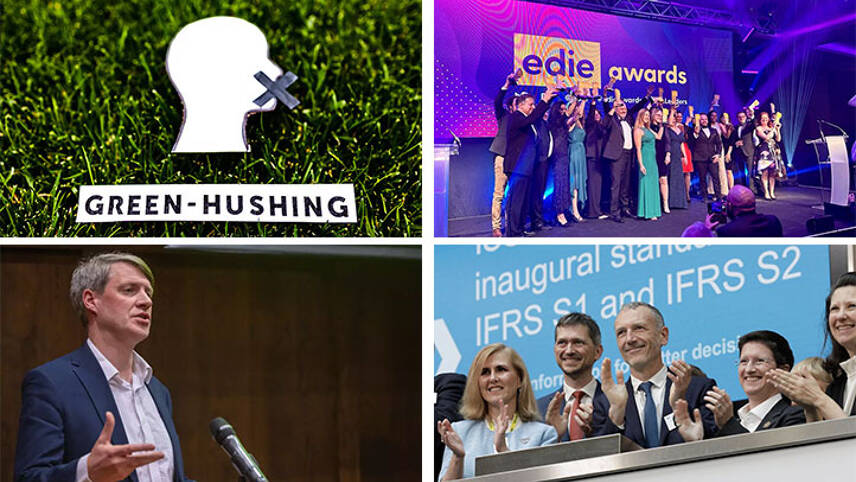
The edie offices will close for Christmas and New Year on Friday (22 December) but, before they do, our editorial team is leaving you with plenty of festive treats and reflections on 2023.
This two-part feature summarises our most-read stories for each month of the year, which is likely to be the hottest on record. From the Net-Zero Review being published in early January to the gavel coming down on the UAE Consensus at COP28 in Dubai earlier this month, this feature has all the headlines covered.
Read on for a brief explainer of the sustainable business stories that defined the first half of 2023.
The second half of this feature, covering July through December, can be found here.
January: Davos and the Net-Zero Review highlight opportunities for climate action
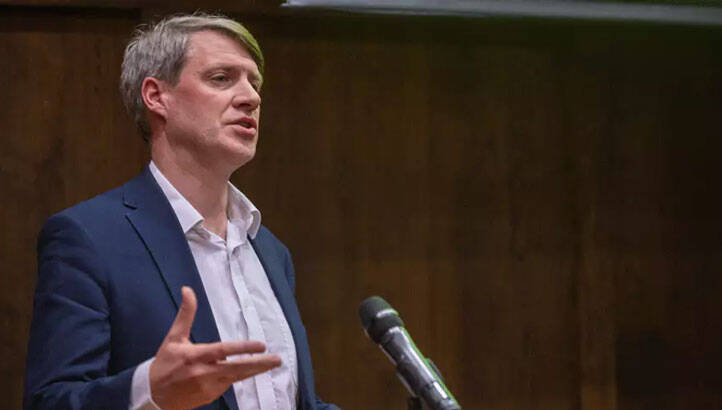
Pictured: Net-Zero Review author Chris Skidmore MP
January is a time for most to ease gently back into work after a festive break, but this is rarely the case in sustainability, especially with the World Economic Forum’s annual meetings in Davos, Switzerland.
2023 proved to be no exception. In Davos, risk experts stated that half of the top ten risks facing humanity in the near term, measured in likelihood and predicted depth of impact, are environmental. The picture only gets worse over a ten-year period.
Wealthy and influential delegates from across the world were compelled to act on climate adaptation, the low-carbon transition and financing a nature-positive economy.
In the UK specifically, less than two weeks into the year, Chris Skidmore MP (pictured above) published his Net-Zero Review. Commissioned during Liz Truss’s brief tenure as Prime Minister, the aim of the Review was to chart a “pro-business, pro-growth” pathway to delivering the UK’s 2050 climate target.
Skidmore’s review included more than 120 recommendations for policy interventions and warned of “significant risks” in terms of decarbonisation delays, including increased transition costs and a potential loss of confidence from businesses, investors and the general public.
Elsewhere in Whitehall, the Department for Transport outlined its plans to make smart electric vehicle (EV) charging “the norm” within two years and the Department for the Environment, Food and Rural Affairs (Defra) set out its Environmental Improvement Plan. This was sold as
Our other best-read stories concerned “climate quitting”, with one-fifth of British workers avoiding roles at companies with poor ESG commitments, and the ever-evolving nature of corporate greenwashing.
February: BEIS axed, DESNZ created
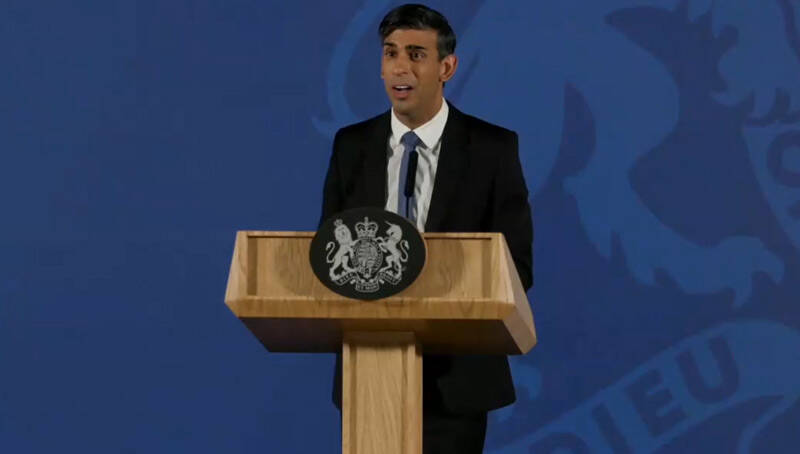
Image: 10 Downing Street
British green policy news did not slow down as February began. Our most-read news story of the year concerned Prime Minister Rishi Sunak’s disbanding of the Department for Business, Energy and Industrial Strategy (BEIS) on 7 February.
He split the workforce into the Department for Business and Trade and the Department for Energy Security and Net-Zero (DESNZ). Grant Shapps was chosen to head up the latter and proved slow to shout about the ‘Net-Zero’ part of his title. Kemi Badenoch was selected to lead the former.
In corporate news, edie readers were particularly interested in Salesforce’s strategy for purchasing renewable energy certificates from small projects in the global south, plus an update to HSBC’s risk matrix that included the addition of greenwashing.
The change from HSBC came less than a year after the bank had two out-of-home adverts banned in the UK on the grounds of misleading environmental claims.
March: IPCC reports, Budget bonus for carbon capture, edie Awards
March’s most-read edie story came mid-month when UK Chancellor Jeremy Hunt made a £20bn, 20-year commitment to carbon capture in his Budget speech. Hunt additionally unveiled a new financial support package for small modular nuclear.
Just five days later, perhaps the most important climate science report of the year was published by the Intergovernmental Panel on Climate Change (IPCC). The synthesis report warned that stated policies are likely to result in a 2.8C trajectory even if delivered in full. At this level of warming, many places will not be “liveable”, with the IPCC warning of increasing risks such as coastal flooding and food and water insecurity that would put up to 3.3 billion livelihoods at risk.
Read edie’s explainer of the report’s calls to action for businesses here.
As March came to a close, the UK Government published a flurry of green policy documents in an occasion described as ‘Energy Security Day’ or ‘Green Day’. There was little in the way of new commitments, beyond a handful of Skidmore’s review recommendations being adopted.
Recommendations adopted included a review of gas vs electricity price balancing and a target to grow solar generation capacity to 70GW by 2035.
March also marked the edie Awards 2023 announcements. At a glittering ceremony in London, Mitie, Microsoft and Capgemini were among the winners. A full list is here.
April: Advertisers warn of sustainability knowledge gap as Puma consults youth activists

Image: Puma
The UK Government seemed not to have any more major rabbits to pull out of hats in terms of green policy. In April, our three most-read stories were all about sustainability skills and strategizing.
Puma’s initiative captured the minds of those keen to avoid greenwashing by running claims and strategies through an additional sense check.
And, speaking of greenwashing, another popular edie article covered OVO Energy’s decision to stop investing in renewable energy generation of origin (REGO) certificates. The energy supplier said that this approach was not reducing energy sector emissions in the real world and risked misleading consumers.
May: Crocs delays net-zero target
The big sustainable business news in May, a month in the middle of sustainability reporting and annual general meeting season, came from US-headquartered footwear brand Crocs. The business was one of the first to publicly delay its net-zero target, pushing it back from 2030 to 2040.
This change at Crocs came after a 45% increase in emissions year-on-year, attributed partly to acquisitions and partly to improved emissions calculation methods. Crocs called the 2040 target “still ambitious” but “more credible and realistic”.
In policy, eyes turned to new mandates taking shape in the EU. The bloc’s Parliament voted in favour of new restrictions on product claims such as ‘carbon-neutral’ that were supported by offsetting. Restrictions agreed in May and yet to be enforced will also prohibit general claims like ‘eco’ without supporting evidence.
As one reporting season ended, focus also turned to the European Corporate Sustainability Reporting Directive (CSRD) which comes into force on 2024. A poll of 801 UK-based businesses found that six in ten were unprepared to meet the CSRD implementation deadline, with the most common pitfall being Scope 3 (indirect) emissions reporting.
June: ISSB’s first two standards launch
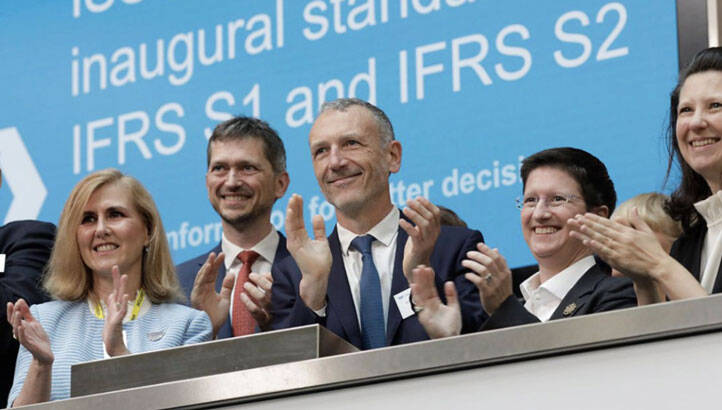
Pictured: The launch of the ISSB’s first two standards
Speaking of sustainability reporting standards, June marked the launch of the International Sustainability Standards Board’s (ISSB) first two frameworks, developed with the intention of unifying corporate climate disclosures. The Board’s initial focus is on climate-related risks, opportunities and impacts.
This news was widely welcomed as “long-awaited” and “an important step”.
Elsewhere, the Science-Based Targets initiative (SBTi) published new guidance on how larger companies can engage with the supply chains and get suppliers to set their own science-based targets. This is crucial because SBTi-approved targets must cover a certain proportion of Scope 3 (indirect) emissions.
And, yet again, greenwashing-related articles proved popular. The UK’s Advertising Standards Agency banned Shell from running an out-of-home advertising campaign using the tagline ‘the UK is ready for cleaner energy’, and a new Sustainability Perceptions Index revealed that household brands were missing a huge commercial opportunity by not accurately and concisely communicating their environmental performance.
The second half of this feature, covering July through December, can be found here.
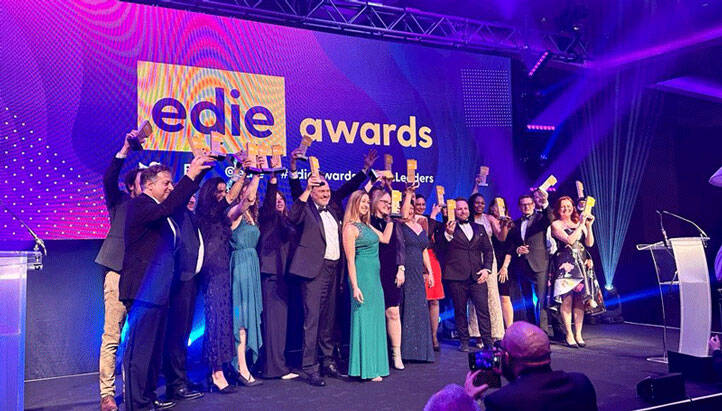



Please login or Register to leave a comment.